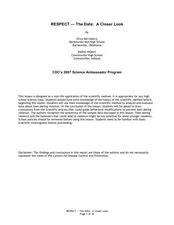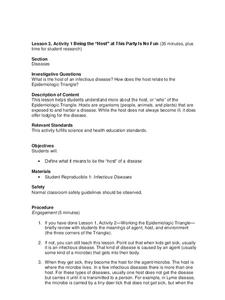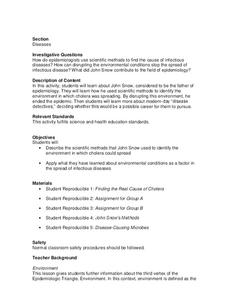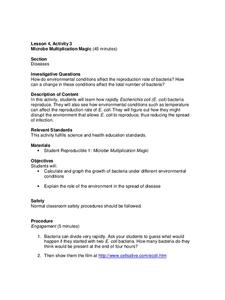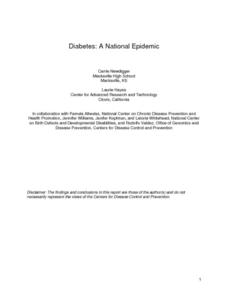Curated OER
Respect--The Data: A Closer Look
Students explore the steps in the scientific method process. In this science lesson, students identify warning signs that someone is in an abusive dating relationship. They evaluate the credibility of information sources.
Curated OER
Take the Lead — Get the Lead Out
High schoolers research about the physiological effects of prolonged lead exposure. In this chemistry lesson plan, students investigate the lead content of different paint, soil and water samples. They analyze data trends and share their...
Curated OER
Pets and People
Students discuss the pros and cons of having household pets. For this health lesson, students identify different types of diseases they can get from pets. They evaluate their pet interactions and suggest ways to modify health habits...
Curated OER
Myth Busters: HIV Transmission
Students discuss the facts and myths about HIV. In this health lesson, students explain how diseases spread from person to another. They create a presentation to share their research findings with the class.
Curated OER
Entomologists on Safari: On the Hunt for Mosquitoes
Students research about the symptoms of West Nile Virus. In this health lesson, students play the role of scientists investigating mosquito activity in a fictional community. They suggest ways to prevent West Nile virus infection by...
Curated OER
What is Wrong with My Pet? - An Introduction to Zoonoses
Learners describe how ringworm and roundworm cause diseases in both humans and animals. In this life science lesson, students research how these diseases can be transmitted. They create an information brochure to promote public awareness...
Curated OER
HIV/AIDS
Tenth graders discuss facts and myths about HIV transmission. In this biology lesson, 10th graders complete an HIV awareness poster and scavenger hunt. They simulate the transmission of the disease through a class activity.
Curated OER
Confident Commute: Increasing Safety for Teen Drivers
Students brainstorm possible causes for motor vehicle accidents involving teen drivers. In this biology lesson, students study national data regarding teen driving behaviors. They create awareness materials to help promote safe driving...
Curated OER
Full Circle Advertising: A Look at Teen Alcohol Use and Fetal Alcohol Syndrome
High schoolers analyze ads and learn about the effects of alcohol. Note that the PowerPoint mentioned in the procedure is not included, so you will need to prepare your own presentation. After the lecture, segue into fetal alcohol...
Curated OER
Why Can’t I Have Sugar? All About Diabetes
Begin the lesson plan by having your class write what they know about diabetes. They learn through a skit how the body metabolizes glucose. A visual representation of the two types of diabetes is displayed, and then learners participate...
Curated OER
The Clark Family Story: Tracing the Cause of Hemophilia
Ms. Strohfeldt did not omit anything when she designed this comprehensive lesson plan on DNA mutation and sex-linked traits. Begin with a pretest as an anticipatory set. Read a case history of the Clark family and the occurrence of...
Centers for Disease Control and Prevention
Understanding the Epidemiologic Triangle through Infectious Disease
Introduce infectious diseases and the epidemiologic triangle. A helpful resource describes the agent, host, and environment from the three vertices as well as the time factor, which is in the middle. Scholars complete a simple...
Centers for Disease Control and Prevention
Being the “Host” at This Party is No Fun
Discuss the symptoms and variations from infectious diseases from one person to the next. After a class discussion, small groups complete research on the topic.
Centers for Disease Control and Prevention
Learning about Giardia and Giardiasis - Research and Role Play
Young biologists begin researching giardia and completing an epidemiologic triangle. They then portray either a parent of a sick child or a physician in a fun role play activity.
Centers for Disease Control and Prevention
Diseases
During a cholera outbreak, scientists presented two theories; one theory was based on miasma and the other on germs and contaminated water. The lesson looks at the scientific process for finding the real culprit.
Centers for Disease Control and Prevention
Microbe Multiplication Magic
A instructional activity introduces the reproduction rate of E. coli though a video. Then scholars complete a data table and graph of reproduction rates in ideal conditions as well as less than ideal conditions.
Agency for Toxic Substances and Disease Registry
Don't Mess with Mercury (Lesson C)
The health effects of mercury exposure if the focus of the first of three activities about the properties of metals. Pairs research mercury to write, prepare, and share posters, articles, or PSAs with the class.
Agency for Toxic Substances and Disease Registry
Don't Mess with Mercury (Lesson A)
Mercury is the only metal that is a liquid at room temperature. Teach your class this and many more interesting mercury facts by assigning an engaging task. A public relations activity, the exercise informs pupils of the hazards of...
Agency for Toxic Substances and Disease Registry
Don't Mess with Mercury (Lesson B)
At one point, people thought mercury was therapeutic for humans, but now we know it is highly toxic. The second of three activities covering mercury focuses on its health hazards if humans are exposed. Pairs research and answer questions...
Curated OER
Human Embryo Development and Birth Defects
Open this lesson with a discussion on birth defects. Break the class into groups to visit a website and learn about what happens at each stage of human embryo and fetal development. Assign each group a particular birth defect to...
Curated OER
Alzheimer's Disease
Investigate Alzheimer's disease. Conduct research using a variety of resources, obtain information, and input the data into a Microsoft Excel spreadsheet. Identify trends in the data and categorize them for an audience.
Curated OER
Autism Spectrum Disorders: The New Rainbow
Students conduct research into the area of Autism Spectrum Disorders. They use the internet and a variety of resources in order to obtain information. Students use the information to take part in a writing project of authoring a new...
Curated OER
1 - 3 - 6 Plan!
Pupils engage in a variety of activities in order to increase knowledge about The Early Hearing Detection and Intervention Program. They build a model of the ear and demonstrate to the instructor the anatomy of the ear and explain the...
Curated OER
Diabetes: A National Epidemic
Students investigate the disease of diabetes. They observe research results to graph the trends of diabetes to contribute to the problem of being overweight. They explain in class discussion the physiological changes that occur in the...
Other popular searches
- Cdc World Health
- Cdc Array
- Cdc Health
- Cdc Lab
- Cdc Classes
- Cdc for Children
- Cdc Microbes Lab
- Cdc for 8th Graders


